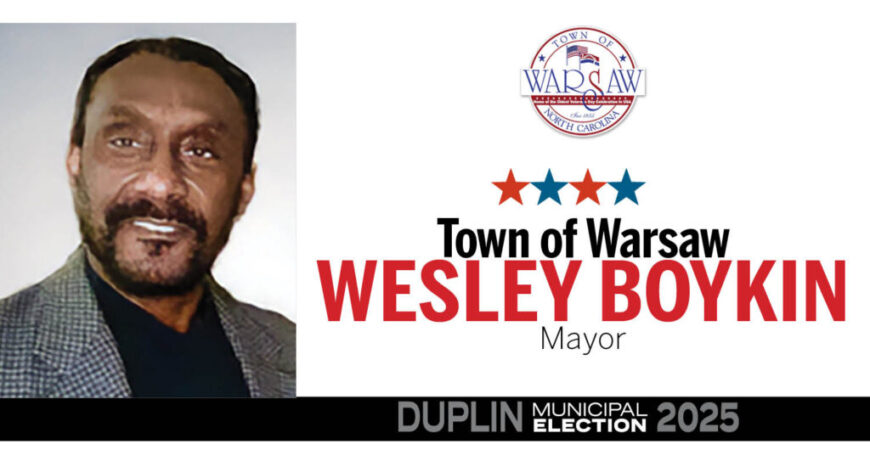Candidate Q&A series | Warsaw Mayor
Wesley Boykin didn’t plan to run for office — but after four years attending town meetings and watching what he describes as a pattern of inconsistent leadership and eroding public trust, he says he could no longer stay on the sidelines. In this Q&A, the first-time candidate shares how he would involve residents in the process, and focus on long-neglected infrastructure issues if elected mayor of Warsaw.
What is your political background? What motivates you to seek office?
I have not held a politically elected office. If the voters of Warsaw choose me as their mayor, this will be my first. However, a thorough review of my professional background and experiences, and a side-by-side comparison of leadership qualities and decision-making abilities, will reveal a stark contrast and I’m confident it will be evident that I will prevail in any honest assessment.
I did not set out to run for the mayor of Warsaw. I am a Warsaw native and I love the residents of our town. It is my home and its residents are my people, my community. I am vested in the progress and success of Warsaw. Yet, I was comfortable being a loyal supporter of the existing elected officials.
For four years, I faithfully and dutifully attended the commissioners’ meetings; I observed their decision-making procedures, their awareness of the problems, their preparation for and insights that guided their approach to making life-changing decisions for residents and themselves. I saw many incidents where the implementation of their own policies and practices were inconsistent, and what appeared to be self-serving. I observed disturbing practices that routinely disrespected voters. I saw what was lacking and for four years; I observed the patience of citizens eroding, turning to anger and upset. Finally, after the June 2025 budget hearing and approval, I realized the only way to bring the needed integrity and unyielding commitment to the Warsaw Community to the Warsaw Board of Commissioners was to run for mayor and win the November 2025 Municipal Election.
What strategies would you use to restore trust between leadership and residents?
My approach to problem-solving is rooted in the concepts of results-based accountability within the collective impact model of service delivery. Results-based accountability is a science and an art that has a success record in both the for-profit private sector and public sector. Hence, it can be easily grasped by staff, the Board, the community and business and civic leaders. It is not a single strategy, nor does the collective impact approach to improved outcomes dictate any specific strategies. It does, however, ensure that all groups in a community are knowledgeable of the problems and then provide viable solutions that can be tracked, monitored and measured for success. This yields robust guidance to decision-makers and built-in accountability at all levels. This collective community impact approach will build harmony, Bud accountability, minimize duplication of effort, target limited community resources, and gets results/improvement.
The town failed to inform the public for days after millions of gallons of partially untreated water spilled into Stewarts Creek. What would your administration do differently to ensure transparency and timely public notification in future incidents?
This was a colossal failure of both staff and the Board of Commissioners. The spill was horrific, but the lack of transparency, the refusal to inform present potential legal matters, but most importantly, it broke the public trust completely. The collective impact approach will be applied to staff as well. This approach will include community advisors to help develop a communication plan for the Town Manager to follow in all problems and successes that will inform the Board, then the Manager and/or Mayor will inform the public. This will include a full description summary of the problem or success (good news), a press release, and a presentation outline. This will become a standard practice and a performance expectation.
Warsaw has faced repeated violations of wastewater treatment standards. How will you restore compliance and trust, and what reforms would you propose to avoid future environmental breaches?
Building trust in staff and stakeholders is an area in which I have 25+ years of experience in various workplaces. It not easily explained to everyone, but it is easily demonstrated by modeling excellence, knowledge, expertise in multiple aspects of the workplace, utmost integrity, and building relationships with mutual respect. Following sound polices with comprehensive administrative procedures can be done more easily with the appropriate skills and abilities. Building trust begins with respecting others. This leads to respect given or respect earned. Successful team-building is an ongoing, never-ending effort. As mayor, this will be a priority.
$63,000 was allocated to drainage in the FY2025–26 budget, compared to over four times that amount for DreamWorks. Do you think critical infrastructure is being underfunded, if so what would you do to change that?
This is sad and unfortunate. It is a direct reflection of an unranked, non-prioritized budget development process. It appears to be based on what select individuals desire to happen or what they prefer over other areas without conducting a thorough environmental scan to determine real immediate and emerging needs. I have not only observed this in action for 4 years, but several of us have offered to serve as community advisors during the public address, before the budget process begins, all to no avail. Our Warsaw Community has many residents with a plethora of business and other skills who are willing to serve as volunteers. For instance, I have managed budgets, consisting of many departments and totaling $300+ million in a single fiscal year, without penalty. The budget development process can change easily, but it has to be a mandate from the Board of Commissioners. This is a governance decision.
What will your capital improvement plan look like under your leadership?
If entrusted with the majority vote for mayor, the Town of Warsaw will begin a Capital Improvement Program. The Manager will be charged with identifying a Blue Ribbon Panel to start work immediately. This panel’s membership will be approved and officially appointed by the Board of Commissioners. Within six months, or sooner, a viable action plan should be presented with various achievable strategies and funding sources that, once adopted, will be implemented to build or rebuild our sewage/wastewater system.
Facilities management, maintenance, and the specific areas of environmental sciences that deal with wastewater management are not my areas of expertise. Leadership management, administrative management, public accountability, collective impact, strategic planning, and visionary leadership are areas where I have excelled. And these are areas and skills that Warsaw desperately needs to successfully break the current fiscal and talent chains that are currently upon us. A full understanding of the foundational needs will be evident in the Action Plan developed by the officially appointed Blue Ribbon Panel of experts and concerned residents discussed above.
The town prioritized funding a recreation facility while roads and drainage remain underfunded. Would you reverse this priority? If not, how do you justify it to residents demanding basic services first?
I do not have a comprehensive understanding of the process that the town used to prioritize this project or others. Therefore, I cannot commit to reversing any prior decision without a thorough review and full understanding of that decision and the allocated funds (designated, general funds, grant-funding, etc.) I can say that I am committed to making sound decisions with transparency. I can say that I will be committed to the ethical and civically responsible use of all public dollars to serve Warsaw. I have taken, and will continue to take, this fiduciary responsibility seriously. To do otherwise, in my professional assessment, can be criminal.
If elected, what are the first three actions you would take in your first 90 days in office?
I have developed a first draft of my 90 Day Action plan. If the town chooses me as the Mayor of Warsaw, this plan will immediately be reviewed by staff and a Select Panel for refinement and impact assessment. This 90 Day plan will be presented to the full Board for adoption. This plan will commit all involved (staff and Board) to a set of core values with common definitions, a set of actions that I see are needed and expected outcomes with timelines generated by the Select Panel. My 90-day plan highlights many areas of equal importance that will go beyond the first three months. When considering action items that can be accomplished within the 90-day window, a major focus of my actions will target these four objectives: (1) improved administrative procedures with emphasis on human resource and talent management, (2) a more comprehensive, transparent FY 2027 Budget Development Process, (3) a thorough examination of the fiscal and financial management system including revenue, expenditures and contracting, and (4) establish a Capital Improvement Program with a laser-focus on the wastewater/sewage facility.
How would you address infrastructure and public service deficiencies?
This is a very broad question to address succinctly. Actually, without more specifics, I have to rely on my understanding of what you mean; and infrastructure and public services are two distinct functional areas. I would need to know how the areas are organized; what are the services provided in each area; how staff are selected, assigned, and trained; and what specific resources they need to carry out their duties and responsibilities. If “infrastructure” refers to maintaining lawn/grass, clean trim ditches, safe non-dilapidated buildings, then developing a standard prioritized list of services by neighborhood based upon identifying the worst-case scenario, and then ranking those needs. Then, staff can develop a schedule over time to repair or replace within each budget year. This acknowledges that every item or neighborhood will not get the same service each year. Yet, over time, on a rotating basis, all neighborhoods would get a more complete service or overhaul. Currently, it appears the town does patchwork to the same problems year after year in all neighborhoods in need. As a result, the patchwork-type solutions are never permanent, and the problem cycle repeats.
 Twitter
Twitter Facebook
Facebook Instagram
Instagram





